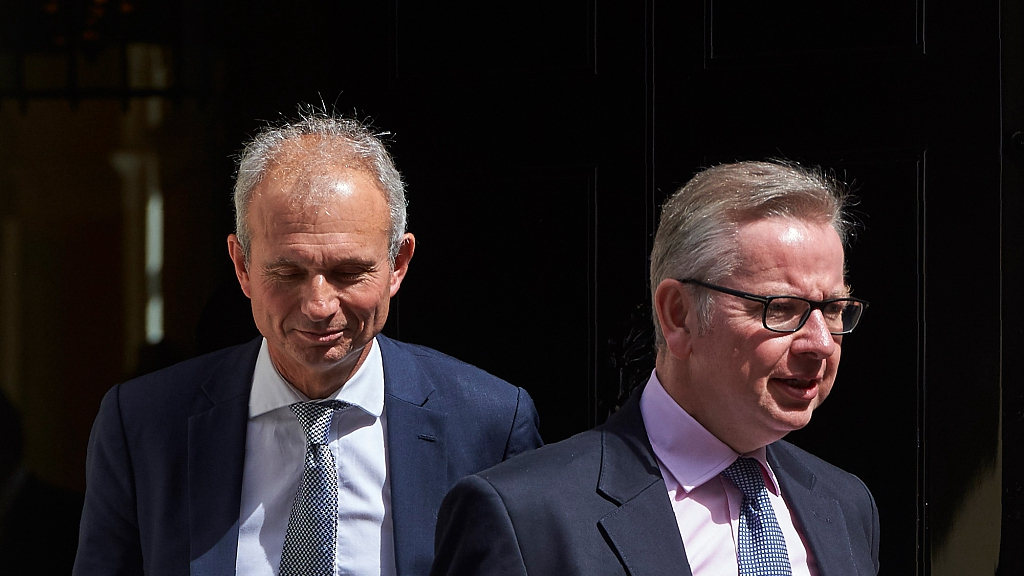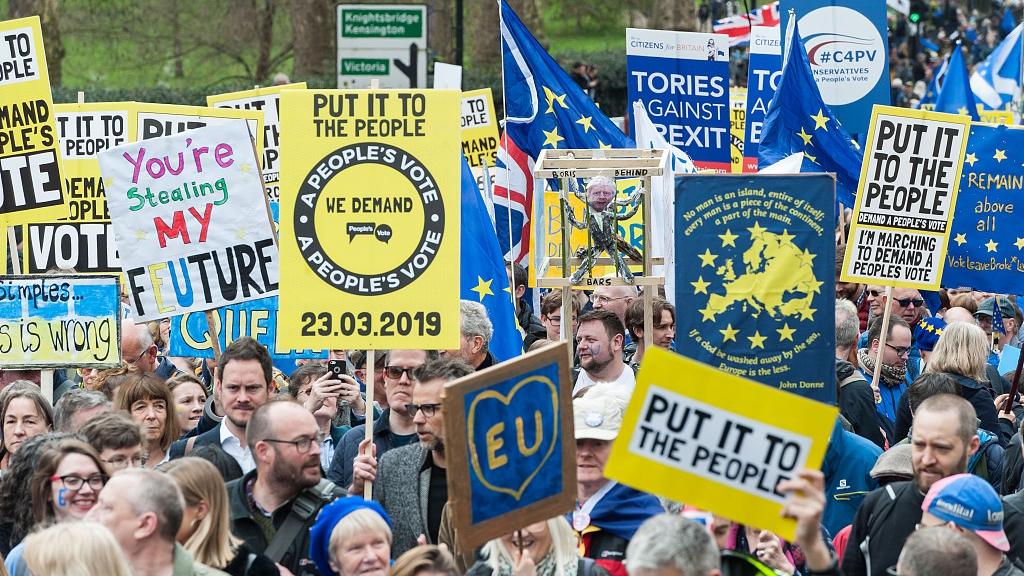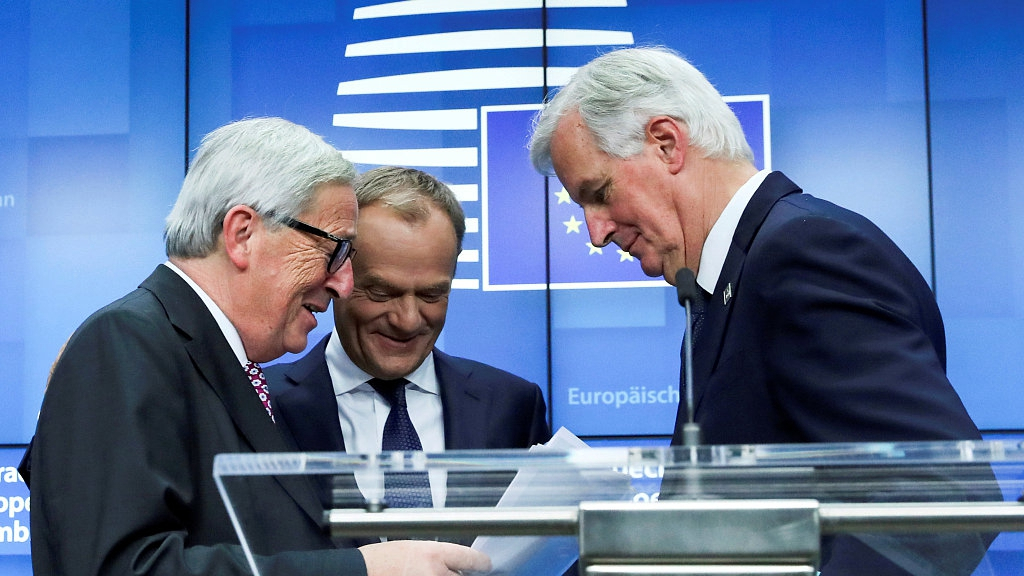British Prime Minister Theresa May held crisis talks Sunday with Conservative colleagues as she tries to plot a path through a pivotal week in the Brexit process amid reports her leadership is under imminent threat.
Ensconced at her country residence Chequers, the embattled premier met with Tory Brexiteer MPs, including the influential Jacob Rees-Mogg and former foreign secretary Boris Johnson – widely seen as wanting to replace her.
Read more:
May must decide when, or even if, to ask lawmakers to vote again on her unpopular EU divorce deal which they have already overwhelmingly rejected twice.
After a particularly chaotic week even for May's crisis-plagued tenure – during which she made an ill-judged attack on MPs' intransigence on her plan – speculation is rife that Conservatives are preparing to force her to resign.

Britain's Lord Chancellor and Justice Secretary David Lidington (L), Britain's Environment, Food and Rural Affairs Secretary Michael Gove, leave from 10 Downing Street in central London, July 18, 2017. /VCG Photo
Britain's Lord Chancellor and Justice Secretary David Lidington (L), Britain's Environment, Food and Rural Affairs Secretary Michael Gove, leave from 10 Downing Street in central London, July 18, 2017. /VCG Photo
The Sunday Times reported she was "at the mercy of a full-blown cabinet coup," with plans afoot for her de facto deputy David Lidington to take over in a caretaker capacity. The newspaper said it had spoken to 11 senior ministers who "confirmed that they wanted the prime minister to make way for someone else" and planned to confront her at a cabinet meeting on Monday.
Such gatherings usually take place on Tuesdays but Downing Street confirmed one was scheduled for 10:00 am (1000 GMT) Monday.
The Mail on Sunday said May could be ousted "within days" and Environment Secretary Michael Gove, a prominent Brexiteer, could become interim leader. Both Gove and Lidington have denied any desire to take over the leadership.

Hundreds of thousands of people take part in the "Put it to the People" march through the capital followed by a rally in Parliament Square to demand a public vote on the final outcome of Brexit, March 23, 2019. /VCG Photo
Hundreds of thousands of people take part in the "Put it to the People" march through the capital followed by a rally in Parliament Square to demand a public vote on the final outcome of Brexit, March 23, 2019. /VCG Photo
"It's not the time to change the captain of the ship," said Gove. Finance Minister Philip Hammond on Sunday criticized the supposed plotters, arguing it would be "self-indulgent" to try to switch the leader. "Changing the players doesn't solve the problem," he told Sky News. "We've got to resolve this issue."
A Downing Street statement described the Chequers meetings as "lengthy talks with senior colleagues about delivering Brexit."
Uncertainty reigns
May is also confronted with the prospect of lawmakers seizing control of House of Commons procedures in order to hold a series of so-called "indicative votes" to reveal what support exists for other options on Brexit.
It follows May securing at a European Union summit this week a delay to Britain's scheduled March 29 departure for at least three weeks to get her agreement approved or find a viable alternative.

European Commission President Jean-Claude Juncker (L), European Council President Donald Tusk (C) and European Union's chief Brexit negotiator Michel Barnier (R) react during a news conference after the extraordinary EU leaders summit to finalize and formalize the Brexit agreement in Brussels, Belgium, November 25, 2018. /VCG Photo
European Commission President Jean-Claude Juncker (L), European Council President Donald Tusk (C) and European Union's chief Brexit negotiator Michel Barnier (R) react during a news conference after the extraordinary EU leaders summit to finalize and formalize the Brexit agreement in Brussels, Belgium, November 25, 2018. /VCG Photo
Britain's parliament, as well as the cabinet, has been deadlocked for months over Brexit, with lawmakers unable to decide how to implement the 2016 referendum vote to leave the EU, reflecting bitter divisions nationwide.
On Saturday, organizers estimated one million people took part in
a pro-Europe march through central London demanding another public vote on leaving the bloc. Following the agreement with the EU to postpone Brexit – which MPs must still vote into British law next week – the path forward still remains highly uncertain.
If May's deal finally wins MPs' backing, Britain will leave the EU on May 22 under the terms she struck with the bloc last year. If it is not passed in the coming weeks, London must outline a new plan or face a no-deal Brexit as early as April 12.
A request then for another, likely lengthy, an extension would require holding European Parliament elections in May.
(Cover: British Prime Minister Theresa May speaks to the media at the end of the first day of a two-day summit of European Union leaders, Brussels, Belgium, March 21, 2019. /VCG Photo)
Source(s): AFP





